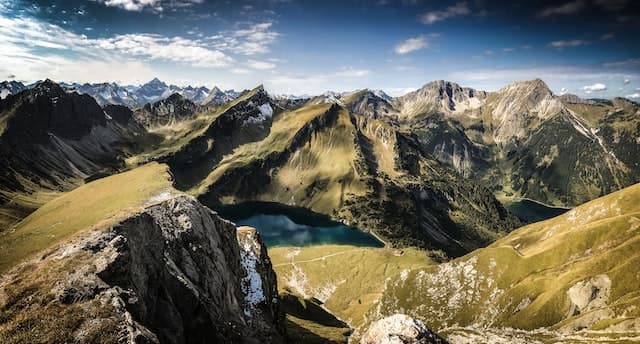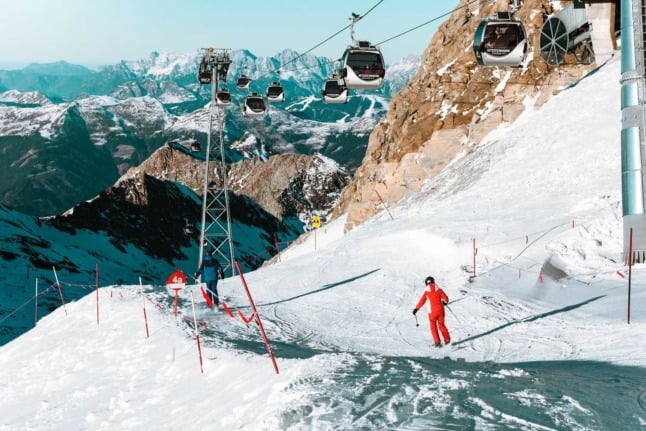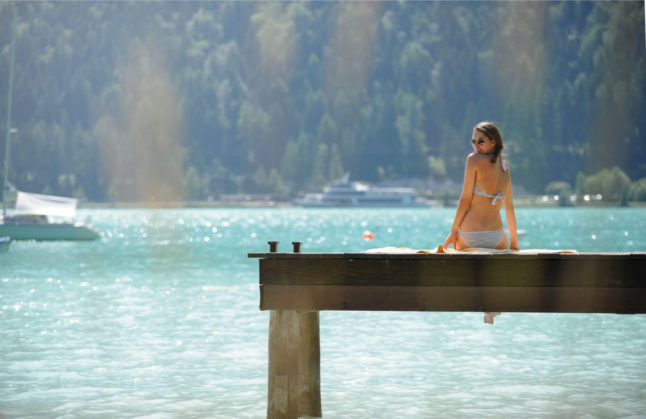Eight things to know before moving to Tyrol in Austria

The Local’s Hayley Maguire has lived in Tyrol for almost six years. For anyone considering a move to the Austrian Alps, here’s what you need to know.
Dreaming of a life in the mountains? Then Tyrol in western Austria is almost as picture-perfect as it can get.
But while the alpine lifestyle is healthy and peaceful, it’s not without a few challenges.
So before embarking on a move to Tyrol, here's what life in the mountains is really like as an international resident.
FOR MEMBERS: How much do you need to earn for a good life in Austria?
The cost of living is high
Living in Tyrol is not cheap. In fact, it’s really expensive with a premium price tag for everything from food to accommodation.
For example, in 2022, Tyrol was revealed to be the most expensive federal state in Austria for rent and groceries in the capital Innsbruck are 3 percent more expensive than in Vienna. Even petrol prices are usually more expensive in Tyrol compared to the east of the country.
The result is a beautiful place to live surrounded by nature. But one that will make your bank balance work for it.
The job market is limited
Apart from the capital city of Innsbruck, Tyrol is mostly made up of small towns and villages. This means the job market is limited compared to places like Vienna and Upper Austria.
As a result, many people that move to the mountains end up making a career change, working with companies remotely or setting up a freelance business.
And for those that do choose to find a job locally, it can mean accepting a salary that is lower than the national average.
For example, a 2022 salary report by StepStone showed the average gross national salary in Austria for full-time work was €49,609. But in Tyrol the average salary was €47,682.
Part of the reason is that two key industries in Tyrol are hospitality and trade – both of which do not create high salary jobs. There are also many people that don’t work full-time all year due to the temporary shutdown of tourism in between seasons.
All of this has an impact on people’s earning potential, which is something to consider before moving to the mountains.
READ ALSO: 10 things you only know about Austria when you move here
Winter sports are a way of life
The Alps are made for winter sports and the winter season is a key part of life in Tyrol, both for the local economy and the lifestyle.
In fact, many people’s livelihoods are heavily dependent on winter sports and the tourism that comes with it. And in the winter months there is not much else to do apart from play around in the snow.
But it’s not all about downhill skiing and snowboarding (that are expensive and can be dangerous). There are plenty of other activities to enjoy like cross-country skiing and snowshoeing, which are considerably cheaper than buying a ski pass.

Whether you're looking for a lively or sleepy ski resort, Austria has something to offer. Photo by Daniel Frank on Unsplash
The locals speak dialect
Austria is officially a German-speaking country, but the reality is most Austrians speak dialect. And in Tyrol, it’s a very strong dialect.
This means if you go into a restaurant, the menu will be in German. Or if you have to fill out an official form, it will be in Hochdeutsch (High German). But the people working in the restaurant or local government office will probably speak dialect.
Not surprisingly, this can be confusing for people hoping to practise their German skills but are met with dialect instead. Especially when language schools in Tyrol teach Hochdeutsch.
The solution for many international residents in the Austrian mountains is to speak a mixture of German and English (otherwise known as Denglish), with a few dialect words thrown in – depending on the area.
READ MORE: ‘Brutal’: What it’s really like to learn German in Austria
Be prepared to feel like a foreigner
If you like the mountains, then Tyrol is a great place to live. But the local culture is strong and deeply embedded in society, so it can be tough for foreigners to integrate.
This is made even more difficult by the use of dialect (yes, that again), which can seem like another language at times . However, most Tyroleans are welcoming people and are happy to share their culture with you – as long as you also make an effort.
Peak tourist season is annoying
According to the Tyrolean government website, around five million people visit Tyrol each year and there are more than 340,000 beds available in hotels and holiday accommodation across the state.
The only exception to the tourism boom was the winter of 2020/2021 when the industry shut down due to Covid-19 restrictions. For the first time in decades, locals enjoyed skiing and snowboarding on almost empty slopes and there was excited talk of a once-in-a-lifetime opportunity to experience the region without tourists.
Fast forward to winter 2022/2023 and winter tourism has returned with a bang. This means traffic jams, full car parks and busy ski slopes. Although this can be annoying for local residents, it's all part of the experience of living in the Alps.
The weather is extreme
Weather in Tyrol is extreme with cold temperatures in winter, followed by baking hot summers and crazy thunderstorms.
A prime example is from July 2021 when torrential rain flooded the city centre of Kufstein in Tyrol. And in March 2022, forest fires were reported in Tyrol after several weeks of dry conditions, despite thick snow still coating the mountains.
It’s also not uncommon for snow to fall on the mountains for a couple of days in August before the temperature rises again and it’s back to bikini weather.
The trick is to always keep a pair of sunglasses and a warm jacket close to hand, so that you can be ready for anything.
READ NEXT: Discover Austria: How to make the most of 24 hours in Innsbruck

A woman enjoys basking in the sun on the swimming pier in the Buchau, in Achensee, Tyrol (© Achensee Tourismus)
Cash is king
The German-saying, “Nur Bares ist Wahres” (only cash is true), completely captures Austria’s love affair with cash. But why is Austria so keen on cash payments?
A big part of it is the freedom that comes from not having to rely on a bank, funds transfer, a card, a card payment system or even your smartphone battery staying charged enough to pay.
Another reason is anonymity. German-speaking Europe is sceptical of any system that allows payments to be tracked (does your wife really need to know how much you spend on ice cream?).
And the final reason is control. Austrians feel that cash payments give them a lot more control over what is being bought, rather than online payments and direct debits.
Throw in the fact that Tyrolean culture is still traditional in many ways and it’s a recipe for a cash-loving population. The only way to deal with it is to get used to visiting the ATM – particularly before heading to a mountain hut as there is no guarantee card payments will be welcome.
Living in the Alps is still worth it
Despite the challenges associated with living in Tyrol as an international resident, it is still worth it.
The climate, lifestyle and close proximity to nature are transformational, and can easily make you wonder why you ever wanted to live in a big city.
But to make the most of life in Tyrol, it’s important to venture outside of international friendship groups to really embrace the local language and way of life.
Comments
See Also
Dreaming of a life in the mountains? Then Tyrol in western Austria is almost as picture-perfect as it can get.
But while the alpine lifestyle is healthy and peaceful, it’s not without a few challenges.
So before embarking on a move to Tyrol, here's what life in the mountains is really like as an international resident.
FOR MEMBERS: How much do you need to earn for a good life in Austria?
The cost of living is high
Living in Tyrol is not cheap. In fact, it’s really expensive with a premium price tag for everything from food to accommodation.
For example, in 2022, Tyrol was revealed to be the most expensive federal state in Austria for rent and groceries in the capital Innsbruck are 3 percent more expensive than in Vienna. Even petrol prices are usually more expensive in Tyrol compared to the east of the country.
The result is a beautiful place to live surrounded by nature. But one that will make your bank balance work for it.
The job market is limited
Apart from the capital city of Innsbruck, Tyrol is mostly made up of small towns and villages. This means the job market is limited compared to places like Vienna and Upper Austria.
As a result, many people that move to the mountains end up making a career change, working with companies remotely or setting up a freelance business.
And for those that do choose to find a job locally, it can mean accepting a salary that is lower than the national average.
For example, a 2022 salary report by StepStone showed the average gross national salary in Austria for full-time work was €49,609. But in Tyrol the average salary was €47,682.
Part of the reason is that two key industries in Tyrol are hospitality and trade – both of which do not create high salary jobs. There are also many people that don’t work full-time all year due to the temporary shutdown of tourism in between seasons.
All of this has an impact on people’s earning potential, which is something to consider before moving to the mountains.
READ ALSO: 10 things you only know about Austria when you move here
Winter sports are a way of life
The Alps are made for winter sports and the winter season is a key part of life in Tyrol, both for the local economy and the lifestyle.
In fact, many people’s livelihoods are heavily dependent on winter sports and the tourism that comes with it. And in the winter months there is not much else to do apart from play around in the snow.
But it’s not all about downhill skiing and snowboarding (that are expensive and can be dangerous). There are plenty of other activities to enjoy like cross-country skiing and snowshoeing, which are considerably cheaper than buying a ski pass.

The locals speak dialect
Austria is officially a German-speaking country, but the reality is most Austrians speak dialect. And in Tyrol, it’s a very strong dialect.
This means if you go into a restaurant, the menu will be in German. Or if you have to fill out an official form, it will be in Hochdeutsch (High German). But the people working in the restaurant or local government office will probably speak dialect.
Not surprisingly, this can be confusing for people hoping to practise their German skills but are met with dialect instead. Especially when language schools in Tyrol teach Hochdeutsch.
The solution for many international residents in the Austrian mountains is to speak a mixture of German and English (otherwise known as Denglish), with a few dialect words thrown in – depending on the area.
READ MORE: ‘Brutal’: What it’s really like to learn German in Austria
Be prepared to feel like a foreigner
If you like the mountains, then Tyrol is a great place to live. But the local culture is strong and deeply embedded in society, so it can be tough for foreigners to integrate.
This is made even more difficult by the use of dialect (yes, that again), which can seem like another language at times . However, most Tyroleans are welcoming people and are happy to share their culture with you – as long as you also make an effort.
Peak tourist season is annoying
According to the Tyrolean government website, around five million people visit Tyrol each year and there are more than 340,000 beds available in hotels and holiday accommodation across the state.
The only exception to the tourism boom was the winter of 2020/2021 when the industry shut down due to Covid-19 restrictions. For the first time in decades, locals enjoyed skiing and snowboarding on almost empty slopes and there was excited talk of a once-in-a-lifetime opportunity to experience the region without tourists.
Fast forward to winter 2022/2023 and winter tourism has returned with a bang. This means traffic jams, full car parks and busy ski slopes. Although this can be annoying for local residents, it's all part of the experience of living in the Alps.
The weather is extreme
Weather in Tyrol is extreme with cold temperatures in winter, followed by baking hot summers and crazy thunderstorms.
A prime example is from July 2021 when torrential rain flooded the city centre of Kufstein in Tyrol. And in March 2022, forest fires were reported in Tyrol after several weeks of dry conditions, despite thick snow still coating the mountains.
It’s also not uncommon for snow to fall on the mountains for a couple of days in August before the temperature rises again and it’s back to bikini weather.
The trick is to always keep a pair of sunglasses and a warm jacket close to hand, so that you can be ready for anything.
READ NEXT: Discover Austria: How to make the most of 24 hours in Innsbruck

Cash is king
The German-saying, “Nur Bares ist Wahres” (only cash is true), completely captures Austria’s love affair with cash. But why is Austria so keen on cash payments?
A big part of it is the freedom that comes from not having to rely on a bank, funds transfer, a card, a card payment system or even your smartphone battery staying charged enough to pay.
Another reason is anonymity. German-speaking Europe is sceptical of any system that allows payments to be tracked (does your wife really need to know how much you spend on ice cream?).
And the final reason is control. Austrians feel that cash payments give them a lot more control over what is being bought, rather than online payments and direct debits.
Throw in the fact that Tyrolean culture is still traditional in many ways and it’s a recipe for a cash-loving population. The only way to deal with it is to get used to visiting the ATM – particularly before heading to a mountain hut as there is no guarantee card payments will be welcome.
Living in the Alps is still worth it
Despite the challenges associated with living in Tyrol as an international resident, it is still worth it.
The climate, lifestyle and close proximity to nature are transformational, and can easily make you wonder why you ever wanted to live in a big city.
But to make the most of life in Tyrol, it’s important to venture outside of international friendship groups to really embrace the local language and way of life.
Join the conversation in our comments section below. Share your own views and experience and if you have a question or suggestion for our journalists then email us at [email protected].
Please keep comments civil, constructive and on topic – and make sure to read our terms of use before getting involved.
Please log in here to leave a comment.